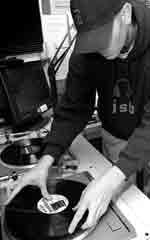Turning Japanese
By RORY VAN LOON
One may wonder what a blonde-haired blue-eyed American has to say about
Japan, let alone Japanese hip-hop.

Playing underground Japanese hip-hop from midnight to 5 a.m. on Fridays, alumnus DJ Trik (Patrick Montgomery) plays more than 50,000 listeners in Japan. “I should’ve brought Red Bull,” Montgomery said. Photos by Emily Tuck |
The truth is that the 25-year-old Fresno State graduate may just surprise
everyone.
Patrick Montgomery, aka DJ Trik, has a radio show on Fresno State’s
radio station KFSR.
His show promotes Japanese underground hip-hop. Japanese Street Beat (J.S.B.),
the name of the show, is on every Friday from midnight to 5 a.m.
Some might question how Montgomery is able to perceive his show as popular,
or even successful, when it is in a time slot that seems unpopular.
The truth is that J.S.B. has the longest time slot of any show on the
station. BecauseKFSR began to broadcast online in Fall 2003, the show
was able to take on a mass audience.
With the help of broadcast servers and loyal fans, the show is able to
reach 55,000 to 56,000 people online.
“The server is full 15 minutes before the show even hits the air,”
Montgomery said.
It also helps that he has a faithful fan base in Japan, where his show
airs from 5 p.m. to 10 p.m., making it a prime time slot for his fans
to listen.
“Hip-hop at its core is very personal and self-expressive; it takes
from the poet, or MC, and pours forth through rhyme, rhythm, allegory
and metaphor,” said Montgomery, who speaks Japanese, German and
English.
Montgomery said one of the problems with American hip-hop and mainstream
Japanese hip-hop is the materialistic nature of the produced music.
He feels the songs and the artists do not stand for anything; the artists
are just putting out what is hot at the moment so they can attain fortune
and fame.
Montgomery said mainstream Japanese culture emulates anything American.
The society is so busy worshipping MTV and BET, it is not taking the time
to realize the potential of Japanese hip-hop, he said.
Montgomery is also passionate about the struggles of the Japanese artist.
Noting that issues and experiences in the United States and Japan are
not the same, he is sincere about letting the Japanese hip-hop artists
be heard.
“Japan is very homogenous; the issues of many of the hip-hop artists
have to deal with the idea of conformity,” Montgomery said. “Hip-hop
encourages the artist to be frank and to confront society.”
With his show, he hopes to introduce people to the beauty of hip-hop.
Montgomery is aware that most viewers will not be able to understand the
words, but he feels that they will still be able to appreciate the music.
Montgomery lived in Asia for about five years, during which time he was
able to travel and absorb the culture.
At first, he was not able to understand the language and often times was
left frustrated and confused.

Montgomery’s compilation CD is called “The Undergrounds Poetical Theory of Evolution Vol. 2.” (Right) Montgomery said his show airs “prime time” in Japan, which is 5 p.m. to 10 p.m. on Saturday. |
For him, music gave him an outlet; he was able to soothe himself with
the music of Japan. Though he was not able to comprehend the lyrics, he
did have a great appreciation for its beauty.
Toward the end of his stay, he decided to engage in one last shopping
spree over at Tower Records in Japan. Once there, he picked up two CDs
that turned out to be the two most quintessential, classic examples of
Japanese underground hip-hop.
These two CDs were Buddha Brand’s “Yameru Mugen No Buddha
No Sekai” and Nitro Microphone Underground’s self-titled album.
At this point, he was able to understand the lyrics. He appreciated the
genuine sincerity of the music.
This undiscovered form of hip-hop reminded Montgomery of the original
American hip-hop; it was untouched, untapped and untainted by the mainstream.
Montgomery notes that many of the MCs in Japan are highly educated. He
knows an MC in Japan that received a master’s degree in molecular
biology, Monthomery said.
“For him, as well as many other Japanese DJs, education is for their
own personal benefits, hip-hop is for the people.”
Montgomery finds that true in many ways.
Graduating from Fresno State with a degree in archeology, as well as linguistics,
he devotes pretty much all of his time to his Japanese Street Beats.
It takes him 40 to 60 hours each week to create his weekly show. He personally
handles every request or comment letter; these letters amount to approximately
500 per week.
He considers his job to be hard work but very satisfying.
“This is no Mickey Mouse type of job and unfortunately I don’t
get paid but it’s worth it,” Montgomery said.
Montgomery said on a recent trip to the Tower District, one of the stores
was airing a segment of his radio program.
He said it was motivating and gratifying to him as he looked around and
found the listeners liking what they heard. That experience alone is enough
for him; he lives for those random occurrences.
Montgomery warns people, however, to be cautious about Japanese hip-hop.
If they find themselves not understanding the music yet becoming very
drawn to it, they may next find themselves working at a college radio
station promoting that very music.
To hear a broadcast of the show or to listen to one of the compilation
CDs that Montgomery has made of Japanese hip-hop artists, log on to www.sound.jp/j-st_beat/.
For more information on Japanese Street Beats and Montgomery (DJ Trik)
e- mail him at jsb411@hotmail.com or tune in on Fridays from midnight
to 5 a.m. on KFSR 90.7.
|

